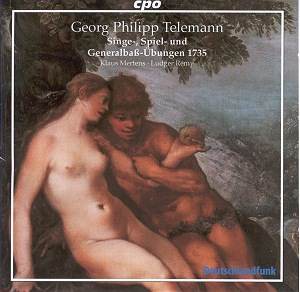These "arias", as the composer entitled them, were published at
weekly intervals in 1733 and 1734, equipped with figuring and
instructions pertaining to thorough-bass playing. They were to be
so easy that he who was inexperienced in music, after he had heard
them a few times, would be able to repeat them in song even without
instrumental accompaniment. They would also be able to be played on
the harpsichord or other instruments without singing.
This and a lot more interesting information can be found in
Ralph-Jürgen Reipsch's well-written liner notes for this
fascinating issue, which is a first complete recording. Simple they
may be, structurally - many of them are strophic - and the texts
are no literary masterpieces, but within this framework it is
remarkable how varied and inventive Telemann is. 47 songs in 70
minutes means that most of them are quite short. In fact the
longest, Die Einsamkeit (track 24), plays for 3:45
and there is a handful of songs under one minute long. They deal
with everyday life, often with a humoristic slant and some of them
are also moral lectures. Track 39, which sticks out for several
reasons, is a song of praise to tobacco, saying:
In all lexica, in all dictionaries,
There's no finer word
Than tobacco.
This word raises my spirits,
This word shortens for me with its long goodness
As many a dear night as many a dear day.
This is the "aria" in a tripartite structure A-B-A, where the
B-section is a recitative philosophizing on the fact that "tobacco"
rightly is a noun of male gender. After this expounding the "aria"
is reprised, making this song a miniature cantata. Other songs are
elegiac, for example Der Einsamkeit already mentioned, while
many also are lively, some of them built on dances. As so often
with collections of this kind it is best heard in small doses, say
five or six at a time, but there was a certain fascination in
hearing the whole disc in one sitting, which I did after first
having dipped into some of the songs to get an idea of what they
were like.
Klaus Mertens has the right voice for these songs. Known for long
as a baroque specialist he is also well versed in lieder-singing
and here we get the best of both worlds. In the booklet he is
described as a bass-baritone, but to my ears it is more a high
light baritone, nimble, with an easy trill and also a lower range
that isn't exactly powerful but is sonorous enough. He has a keen
eye for the texts and gives lively interpretations of the humorous
songs. His half voice is employed with great sensitivity for the
more elegiac songs. His word-pointing can be a mite over-emphatic
at times: track 26 is one example. He also embellishes many of the
songs quite elaborately according to baroque practice. Sometimes I
felt that he over-did it, but probably Telemann would have expected
him to do so, even though the "inexperienced in music" who were a
target group for the songs, would hardly have that capacity. Klaus
Mertens does it with his customary elegance and the experienced
Ludger Rémy provides discreet accompaniments.
Recorded in the Radio House in Cologne the sound is all one could
have wished. The booklet prints the song texts as well as English
translations by Susan Marie Praeder.
Baroque enthusiasts shouldn't hesitate but general listeners with a
taste for good melodic songs should also give it a try.
Göran Forsling


